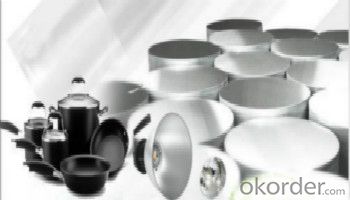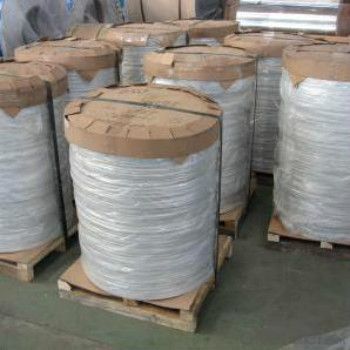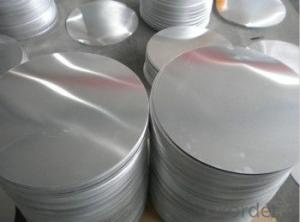Continous Casting Aluminium Circle AA3003
- Loading Port:
- Shanghai
- Payment Terms:
- TT OR LC
- Min Order Qty:
- 5 m.t.
- Supply Capability:
- 2000 m.t./month
OKorder Service Pledge
OKorder Financial Service
You Might Also Like
Item specifice
1. Structure of CC Aluminium in Coil Form for making Aluminium Circle Description
CC Aluminium in Coil Form for making Aluminium Circle is one semi-finished aluminium material. This coil can be rolled down to aluminium coil,sheet,circle ect. The alloy AA1050 is widly used in building, industry ect. Its weight is much lower than steel. So many customers choosed aluminium material instead of steel.
2. Feature of CC Aluminium in Coil Form for making Aluminium Circle
Surfact Quality :
Be free from Oil Stain, Dent, Inclusion, Scratches, Stain, Oxide Dicoloration, Breaks, Corrosion, Roll Marks, Dirt Streaks and other defect which will interfere with use,
Mechenical Property:
Chemical Composite and Mechanical Property
3. Image of CC Aluminium in Coil Form for making Aluminium Circle


4. Specification of CC Aluminium in Coil Form for making Aluminium Circle
Aluminum Coil/Sheet | |
Main Specification | |
Alloy | AA1xxx (AA1050, AA1060, AA1070, AA1100 etc.) |
AA3xxx (AA3003, AA3004, AA3005, AA3105 etc.) | |
AA5xxx, AA6XXX (AA5052,AA5083, AA5754, AA6061, AA6062 etc.) | |
AA8xxx(AA8011, AA8006 etc.) | |
Temper | H14,H16, H18, H22, H24, H26, H32,O/F, T4, T6, T651 |
Thickmess | 0.01mm-100mm |
Width | 30mm-1700mm |
Standard | GB/T 3880-2006/ASTM |
Special specification is available on customer's requirement | |
5. FAQ
1) What is the delivery time?
Depends on actual order, around 20 to 35 days
2) What is the QC system:
We have QC staff of 20 persons and advanced equipment, each production is with MTC traced from Aluminum ingot lot.
3) What market do you mainly sell to?
Australia, America, Asia, Middle East, Western Europe, Africa etc
4)What about payment term?
30% T/T in advance, balance against B/L COPY.
- Q:Can aluminum coils be used for thermal insulation purposes?
- No, aluminum coils cannot be used for thermal insulation purposes.
- Q:Can aluminum coils be used in the production of aluminum honeycomb panels?
- Yes, aluminum coils can be used in the production of aluminum honeycomb panels. Aluminum honeycomb panels are made by bonding aluminum sheets to a honeycomb core material, usually made of aluminum as well. The aluminum coils are typically used to produce the aluminum sheets that form the outer skin of the panels. These coils are rolled into thin sheets and then cut to the desired dimensions before being bonded to the honeycomb core. The use of aluminum coils allows for efficient and cost-effective production of aluminum honeycomb panels, as they can be easily formed and processed into the required shape and size. Additionally, aluminum is a lightweight and durable material, making it an ideal choice for the production of honeycomb panels used in various industries such as aerospace, construction, and transportation.
- Q:Are aluminum coils suitable for food processing and packaging?
- Yes, aluminum coils are suitable for food processing and packaging. Aluminum is a versatile metal that offers numerous benefits for the food industry. Firstly, aluminum has excellent thermal conductivity, which allows for efficient heat transfer during food processing and cooking. This property ensures that food is evenly cooked and prevents hot spots or uneven heating. Additionally, aluminum is a highly corrosion-resistant material, which is crucial for food packaging. It helps to protect the food from external factors such as moisture, oxygen, and light, which can degrade the quality and freshness of the product. Aluminum coils can be easily formed into various shapes and sizes, making them ideal for packaging different food products, including cans, pouches, trays, and lids. Furthermore, aluminum is a lightweight material, which makes it convenient for transportation and reduces energy consumption during distribution. It is also recyclable, meaning that it can be reused, reducing the environmental impact of food packaging. Overall, aluminum coils are well-suited for food processing and packaging due to their excellent thermal conductivity, corrosion resistance, versatility, lightweight nature, and recyclability.
- Q:How are aluminum coils used in the production of heat sinks?
- Aluminum coils are used in the production of heat sinks by being shaped into fins, which are then attached to a base plate. This finned structure allows for increased surface area, facilitating better heat dissipation from the electronic components. The coils are typically formed through a process called extrusion, enabling them to efficiently transfer and dissipate heat, making them an essential component in heat sink manufacturing.
- Q:Are there any limitations to the minimum coil width of aluminum coils?
- Limitations exist for the minimum coil width of aluminum coils due to various factors, such as the manufacturing process and equipment used. Generally, the coil width is restricted by the capabilities of the rolling mill or other processing machinery. The minimum coil width is typically determined by the size of the rolls or mandrels utilized during production. If the coil width becomes too narrow, it can lead to stability and integrity issues, making handling and transportation more challenging. Furthermore, a narrower coil width may impact the overall efficiency of the manufacturing process. Hence, it is crucial to take these limitations into account when establishing the minimum coil width for aluminum coils.
- Q:How are aluminum coils cleaned before further processing?
- Aluminum coils are cleaned before further processing through a series of steps to ensure the removal of any contaminants or impurities. The cleaning process typically involves the use of chemical solutions and mechanical methods. Firstly, the coils are usually soaked in a degreaser or cleaner solution to dissolve and remove any oils, greases, or dirt that may be present on the surface. This step helps to eliminate any organic contaminants that could interfere with subsequent processes. After the initial soaking, the coils are often subjected to a high-pressure water rinse to further remove any remaining residues or particles. This step helps to dislodge and flush out any loosened contaminants from the surface of the coils. In some cases, a combination of chemical cleaning and mechanical scrubbing or brushing may be employed to effectively remove stubborn or baked-on contaminants. This method is particularly useful for coils that have been exposed to more severe environmental conditions or industrial processes. Once the coils have been cleaned, they are typically rinsed again to ensure the complete removal of any cleaning agents or residues. This is important to prevent any adverse effects or interference with subsequent processing steps. Overall, the cleaning of aluminum coils before further processing is crucial for achieving high-quality end products. It helps to ensure the removal of impurities, improve the surface finish, and enhance the overall performance and longevity of the finished aluminum products.
- Q:I've heard many times that it's unhealthy to store or cook food in aluminum, due to leaching, but will this apply to handling aluminum. Also, I heard that most aluminum is coated with a layer of something, to prevent oxidation; is this true?
- aluminum is very biologically unavailable- most forms of aluminium you will come in contact with wont really react with your body. And yes aluminium is actually coated in a thin layer of its own oxide (aluminium oxide) to prevent the entire thing rusting. If it was unsafe to use alot more people would know about it. You are totally fine to grill things in foil and to put foil covered things in the oven!
- Q:What industries utilize aluminum coils?
- There are several industries that utilize aluminum coils for various purposes. One of the major industries that extensively uses aluminum coils is the construction industry. Aluminum coils are commonly used for roofing, siding, and gutter systems due to their lightweight nature, durability, and resistance to corrosion. Additionally, the transportation industry also relies heavily on aluminum coils for manufacturing automotive parts, such as radiators, condensers, and heat exchangers, as aluminum is known for its excellent heat transfer properties. The packaging industry also utilizes aluminum coils for producing cans and containers due to their ability to preserve the freshness and quality of food and beverages. Moreover, the electrical industry relies on aluminum coils for manufacturing transformers, electrical conductors, and wiring, as aluminum is a good conductor of electricity. Lastly, the aerospace industry uses aluminum coils for constructing aircraft parts, such as wings, fuselage, and structural components, as aluminum provides strength while keeping the weight of the aircraft low.
- Q:Are there any limitations on the width-to-thickness ratio of aluminum coils?
- Yes, there are limitations on the width-to-thickness ratio of aluminum coils. The width-to-thickness ratio is an important factor in determining the overall strength and performance of aluminum coils. If the ratio is too high, it can lead to issues such as buckling, warping, or even failure of the coil. The specific limitations on the width-to-thickness ratio depend on various factors such as the alloy composition, temper, and intended application of the aluminum coil. Different alloys and tempers have different mechanical properties and can handle different ratios. Additionally, the intended application of the coil, such as roofing, automotive, or packaging, may have specific requirements for the width-to-thickness ratio. Manufacturers typically provide guidelines and specifications for the acceptable width-to-thickness ratio based on their product offerings. These guidelines ensure that the coils are used within their intended capabilities and prevent any issues related to excessive width-to-thickness ratios. It is important for users and designers to consider these limitations and guidelines when selecting and utilizing aluminum coils. Failure to adhere to these limitations can result in compromised performance, increased risk of damage, and potential safety concerns. Therefore, it is crucial to consult the manufacturer's recommendations and industry standards to determine the appropriate width-to-thickness ratio for a given application.
- Q:Are aluminum coils suitable for automotive applications?
- Yes, aluminum coils are suitable for automotive applications. Aluminum is a lightweight material that offers several advantages for automotive use. It provides excellent thermal conductivity, which allows for efficient heat transfer and cooling within the vehicle. Additionally, aluminum is corrosion-resistant, making it ideal for automotive applications where exposure to moisture and various weather conditions is common. Moreover, aluminum coils have high strength-to-weight ratio, meaning they provide strength and durability while keeping the weight of the vehicle low. This is particularly beneficial for improving fuel efficiency and reducing emissions. Furthermore, aluminum coils can be easily formed and shaped into various automotive components, such as heat exchangers, radiators, condensers, and evaporators, making them versatile and suitable for a wide range of automotive applications.
1. Manufacturer Overview |
|
|---|---|
| Location | |
| Year Established | |
| Annual Output Value | |
| Main Markets | |
| Company Certifications | |
2. Manufacturer Certificates |
|
|---|---|
| a) Certification Name | |
| Range | |
| Reference | |
| Validity Period | |
3. Manufacturer Capability |
|
|---|---|
| a)Trade Capacity | |
| Nearest Port | |
| Export Percentage | |
| No.of Employees in Trade Department | |
| Language Spoken: | |
| b)Factory Information | |
| Factory Size: | |
| No. of Production Lines | |
| Contract Manufacturing | |
| Product Price Range | |
Send your message to us
Continous Casting Aluminium Circle AA3003
- Loading Port:
- Shanghai
- Payment Terms:
- TT OR LC
- Min Order Qty:
- 5 m.t.
- Supply Capability:
- 2000 m.t./month
OKorder Service Pledge
OKorder Financial Service
Similar products
New products
Hot products
Related keywords




























